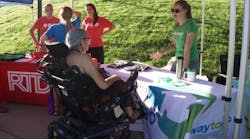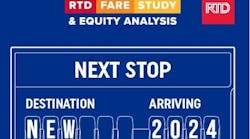Denver RTD reports Zero Fare for Better Air initiative increases ridership
There has been a reported 10 percent increase in the Denver Regional Transportation District's (RTD) overall ridership on bus, rail and paratransit services during the 2023 Zero Fare for Better Air initiative. When compared with the same period in 2022, an additional 1.1 customer boardings occurred on Denver RTD’s system during the months of July and August.
Boardings during the two-month initiative reflect the largest number of customers Denver RTD has had on its system since the COVID-19 pandemic impacted ridership in March 2020.
In comparison with the same period in 2022 mode-specific highlights include:
- Bus saw a 16 percent increase in boardings
- Commuter rail experienced a 14 percent increase in boardings
- Ridership on the A Line increased 14 percent year-over-year and it accounted for nearly 3/4's of commuter rail’s boardings during July and August
- Light rail saw a 13 percent decrease in boardings, much of which can be attributed to months-long planned maintenance projects that impacted the E, H and R lines
- Paratransit saw a 50 percent increase in boardings
“Denver RTD was pleased to welcome many new and returning customers to its system in July and August,” said Denver RTD General Manager and CEO Debra A. Johnson. “The agency and its partners worked together to encourage people in the Denver Metro area to explore new commuting habits. As Denver RTD looks ahead to the future, the agency is focused on providing value over volume to ensure the region’s mobility needs are met.”
In early August, Denver RTD conducted an extensive customer intercept survey to better understand ridership decisions, commuting trends and customer behaviors relating to the Zero Fare for Better Air initiative. The survey directly engaged RTD’s customers onboard buses and trains and at key stops and stations. The intercept survey was distributed across the entire Denver Metro region to align responses with ridership numbers.
Major findings from the customer intercept survey include:
- 74 percent of respondents said the zero-fare initiative influenced their decision to use Denver RTD’s services on the day they were surveyed
- 84 percent of respondents said cost savings was an important factor regarding their decision to use Denver RTD’s services
- 85 percent of respondents indicated that the environmental benefits of the initiative influenced their decision to take a bus or train
- 72 percent of respondents planned to increase their usage of Denver RTD’s services during the initiative
- 33 percemt of respondents said the primary purpose of their trip was work related
- 23 percent of respondents indicated they would have driven themselves if they were not using Denver RTD’s services
Denver RTD has also partnered with the Regional Air Quality Council (RAQC) to determine the overall impact on emissions and ground-level ozone. RAQC, which is lending its subject-matter expertise in this field, is analyzing Denver RTD’s ridership numbers and responses to the customer survey to quantify and better understand the two-month initiative’s impact on air quality. RAQC’s analysis will be included in the final report Denver RTD submits to the Colorado Energy Office as part of its grant agreement with the state. The full report is expected to be submitted in November and will be publicly released at that time.
A separate employee survey was also conducted by Denver RTD to engage frontline staff and garner information about the initiative’s impact on their jobs. Approximately half of employees surveyed felt the Zero Fare for Better Air initiative fostered a welcoming transit environment for customers. An additional 26 percent of respondents expressed a neutral perspective to the question. More than half of frontline employees also indicated they are “somewhat supportive” or “strongly supportive” of the agency being part of a similar, statewide initiative in 2024.
The collaborative, statewide Zero Fare for Better Air initiative was funded through a grant program created by Colorado Senate Bill 22-180 in an effort to reduce ground-level ozone during peak periods by increasing the community’s use of public transit. This year, Denver RTD expanded its zero-fare offering from one month to two, to align with Colorado’s highest ozone months of July and August and leveraged available state funding appropriated for the Ozone Season Transit Grant Program.


